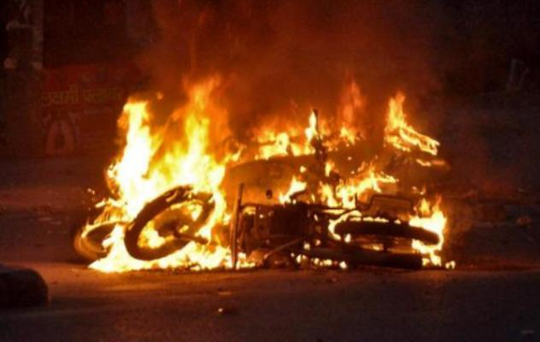Chandigarh, Feb 20: Situation in Haryana continues to remain tense on Saturday a day after violence erupted in several parts of the BJP-ruled state after the Jat community continued its agitation for reservation in government jobs and educational institutions.
At least three people have been killed and over 25 injured in the violence so far prompting the government to issue shoot-at-sight orders and imposing curfew in several areas.
Union Home Minister Rajnath Singh on Friday chaired a meeting at his residence to review the situation in Haryana, which was attended by Defence Minister Manohar Parrikar, External Affairs Minister Sushma Swaraj and Home Secretary Rajiv Mehrishi.
As per reports, Army had been called in nine districts of Haryana and curfew imposed in two most affected districts - Rohtak and Bhiwani.
Authorities clamped curfew and issued "shoot-at-sight" orders in the worst-affected Rohtak and Bhiwani districts on Friday evening.
Out of the three deaths reported so far, one person was killed when Border Security Force personnel opened fire in self-defence after being fired upon by a mob. Two other people succumbed to their injuries in hospital after police fired on rampaging mobs. The injured included a BSF trooper.
The unruly mob indulged in arson. A mall in Rohtak town was looted, reports said. A gun house was also looted and a toll plaza was set on fire near Rohtak while another one was damaged near Sampla.
Haryana Director General of Police YP Singhal told media in Chandigarh that the army has been sought for Rohtak, Jhajjar, Sonipat, Panipat, Jind, Kaithal, Bhiwani and Hisar districts.
"... The chief secretary spoke to the Army chief. The CM (Manohar Lal Khattar) has spoken to Defence Minister (Manohar Parrikar). The effort is to deploy the Army as soon as possible to control the situation," he said.
The injured were taken to the Post Graduate Institute of Medical Sciences in Rohtak, 75 km from Delhi, police said.
He said that a mob attacked a Haryana Police officer and other policemen near the Maharishi Dayanand University gate and held the hostage and more forces had to be sent to rescue them.
"A leaderless mob is moving through Rohtak town. They came near the Circuit House and damaged the vehicle of the deputy inspector general of police and two other police vehicles and set on fire another police vehicle," Singhal said.
The mob attacked the office of the DIG, and set the house of Finance Minister Abhimanyu on fire. At some places in the town, black smoke could be seen coming out of property set on fire by the agitators, who even manhandled media persons at some places.
"We are trying to stop the mob," the police chief said, adding that three companies of paramilitary forces were already stationed and 30 more companies would be deployed soon.
Jat leader Hawa Singg Sangwan said that the youth have taken over the agitation. "They do not have any organised leader and hence the violence is happening. Some mischievous elements have infiltrated the mobs," he said.
The authorities have also blocked Internet and SMS services in the affected districts.
Thousands of trucks, carrying supplies and goods, were stranded in the affected districts due to highways and roads being blocked. Over 40 trains including express trains like Kalka-Delhi Shatabdi Express, Pashchim Express and others were cancelled by railway authorities across Haryana on Friday as the agitation escalated.
In Gurgaon, Jat protestors blocked roads, leading to traffic jams and chaos in the city, adjoining the national capital.
Life continued to be affected in most parts of Rohtak, Jhajjar Sonipat, Bhiwani, Jind, Hisar and some other districts as the agitation by Jats for reservation in jobs and educational institutions continued for the sixth day on Friday.
The protestors have also blocked railway tracks. Hundreds of railway passengers were stranded as protestors blocked the Delhi-Ambala-Amritsar railway track at Rajlu Garhi village in Sonipat on Friday evening.
The stir escalated even as the Haryana government called an all-party meeting in Chandigarh to discuss the reservation issue and the Jat protests. The meeting urged the protestors to end their agitation and remove blockades.
Jat leaders however rejected the appeal.
After the all-party meeting, Khattar said that his government was "in favour of reservation for Jats in the state and is trying to find out ways and means for the same".
Referring to statements of BJP's Kurukshetra MP Raj Kumar Saini, who is opposed to reservation for Jats, Khattar said he had been asked to withdraw his statement. Security had been tightened at Saini's house in Kurukshetra town.
Agriculture Minister OP Dhankar meanwhile said in Gurgaon that the state government was ready to give special backward class quota to the Jats.







Comments
Add new comment